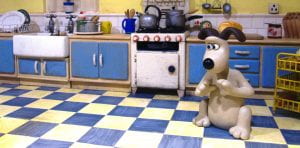Gromit Unleashed Trail VR
Our engineers have used VR to make sure patients of Bristol Childrens Hospital can experience the city’s Gromit Unleashed trail.
Hundreds of thousands of people from across the UK and overseas took part in Gromit Unleashed 2, the third arts trail from Bristol Children’s Hospital charity The Grand Appeal. There were 67 giant sculptures of Academy Award®-winning Aardman characters, Wallace, Gromit and Feathers McGraw – all designed and decorated by a local and high profile artists and brands, including Pixar Animations Studios and DreamWorks.
 The ‘Gromit Unleashed 2 VR Experience’ was developed by Bristol Interaction Group, a research group in Engineering, and Large Visible Machine, an independent mobile platforms game studio.
The ‘Gromit Unleashed 2 VR Experience’ was developed by Bristol Interaction Group, a research group in Engineering, and Large Visible Machine, an independent mobile platforms game studio.
PhD student Gareth Barnaby, who led the VR project, said: “It’s been a great experience to combine our technical expertise with the tireless enthusiasm of the people at The Grand Appeal to create a fun project to be deployed in the real world and brighten people’s days in hospital.
“As a PhD student, it can be hard to see where academia and the real world intersect. This project has shown the difference our work can make and the huge benefits technology can bring. Thanks to everyone at the University who has put in their time to make this project happen, and a huge thank you to The Grand Appeal for the hugely impactful work they do, and for the opportunity to be a part of it.”
Children with complex needs or those undergoing intense treatments, such as bone marrow transplants, are unable to leave hospital, so the University donated over 200 sets of Google Cardboard and two Google Pixel phones, for patients without access to a smart phone. Using the headsets, through virtual reality technology patients are transported to the streets of Bristol to see the sculptures up close and personal in a live setting with the use of 360 camera technology.
“As a PhD student, it can be hard to see where academia and the real world intersect. This project has shown the difference our work can make and the huge benefits technology can bring. Thanks to everyone at the University who has put in their time to make this project happen, and a huge thank you to The Grand Appeal for the hugely impactful work they do, and for the opportunity to be a part of it.”
Children with complex needs or those undergoing intense treatments, such as bone marrow transplants, are unable to leave hospital, so the University donated over 200 sets of Google Cardboard and two Google Pixel phones, for patients without access to a smart phone.
Using the headsets, through virtual reality technology patients are transported to the streets of Bristol to see the sculptures up close and personal in a live setting with the use of 360 camera technology.
Nicola Masters, Director of The Grand Appeal said: “Bristol Children’s Hospital and the 100,000 patients it cares for each year sit at the heart of absolutely everything we do. Virtual Reality is a powerful tool, and what better way to harness this than to bring the trail to the bedsides of young patients who are too poorly to leave their bed or their ward. Taking part in such an immersive and interactive experience is having a brilliant impact not only on the child’s wellbeing, but also on their rehabilitation and recovery in hospitals.”



